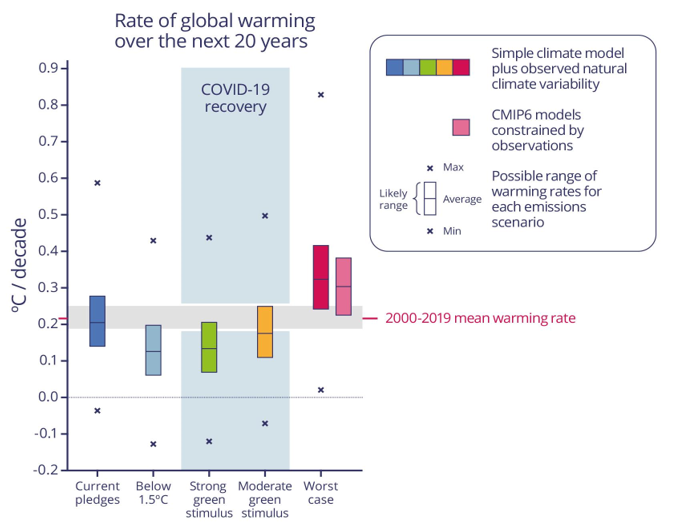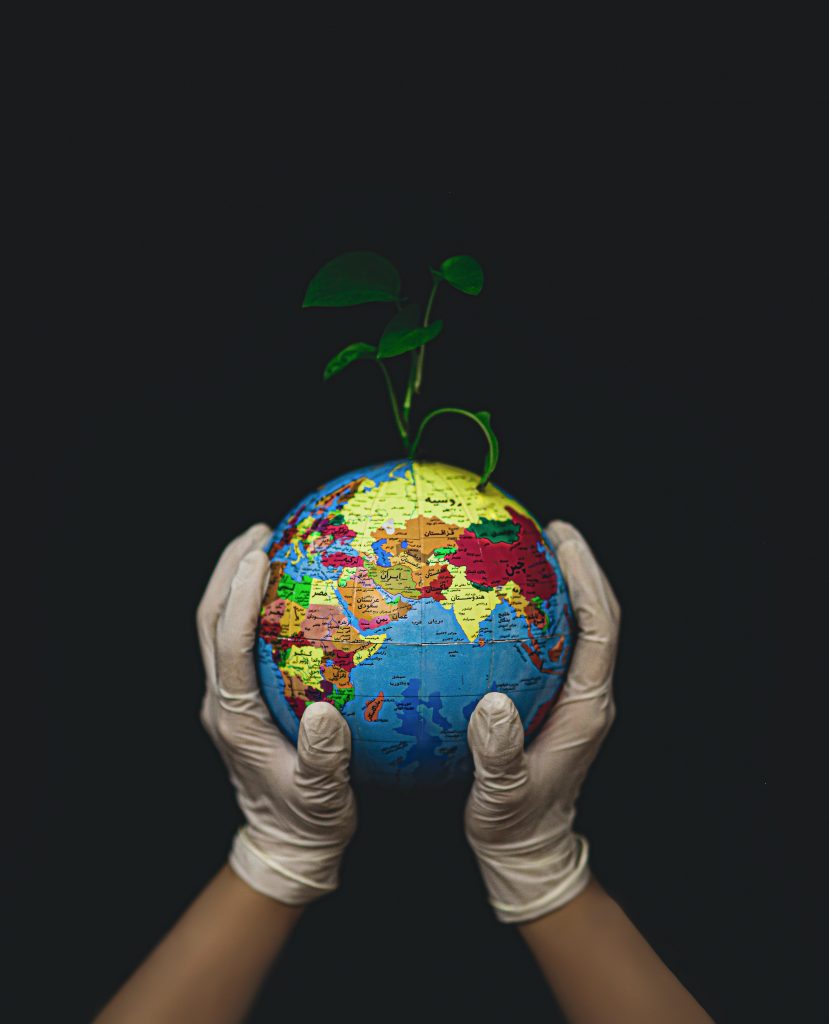COVID-19 economic recovery could slow down global warming by up to half if we make the right choices, and by taking action that tackles both crises, we can ensure that a more resilient world emerges on the other side. Doing so means cutting emissions hard and fast, investing in green technologies and industries, and refusing to bail out fossil fuel companies. High-level action would get us on track for net-zero CO2 emissions by mid-century and give us a good chance of keeping temperature rise below 1.5°C.
Both climate change and COVID-19 are threat multipliers, exacerbating existing problems and hitting the most vulnerable the hardest. At the time of writing, several countries are battling a second wave of coronavirus, whilst 2020 has just been declared the joint warmest year on record.
With global temperatures now almost 1.2°C above pre-industrial levels, limiting warming to 1.5°C, in line with Paris Agreement ambitions, means taking urgent and decisive global action. Without it, we look set to exceed 1.5°C before mid-century, risking more frequent and extreme climate impacts.
A new report highlights how COVID-19 economic recovery could slow down global warming by up to half if we make the right choices. By taking action that tackles both crises, we can ensure that a more resilient world emerges on the other side.
COVID-19 recovery packages can slow down the rate of global warming
In the report, CONSTRAIN has explored what the latest science tells us about avoiding dangerous climate change in the light of COVID-19. Our approach, developed by CONSTRAIN researcher Christine McKenna, combines climate model results with real-world measurements to show how a strong green recovery could both halve global emissions by 2030, and slow down global warming by up to half its current rate. Doing so means cutting emissions hard and fast, investing in green technologies and industries, and refusing to bail out fossil fuel companies.

Figure 1 compares warming rates over the last 20 years (red line; range in grey) with 20 year warming trends for different COVID-19 recovery options (moderate and strong green stimulus pathways), compared to current emission reduction pledges (Nationally Determined Contributions or NDCs), a pathway limiting warming to below 1.5°C by the end of the century and a worst case, no-mitigation scenario. The strong green stimulus (green bar) reflects a 1.2% increase in investment in low-carbon technologies, and a fall of 0.4% in fossil fuels investment, a 50% fall in greenhouse gas emissions by 2030, and global net-zero CO2 by 2050.
This level of action would get us on track for net-zero CO2 emissions by mid-century, and give us a good chance of keeping temperature rise below 1.5°C. By cutting the rate of temperature rise by up to half, it would also give us more time and space in the coming decades to plan for and adjust to whatever climate impacts do come our way.
From ambition to action in the short run
The climate debate often focuses on how global temperatures might change by the end of the century, but policy decisions are made on much shorter timescales. By highlighting the opportunity to cut warming rates in the near future through investments made now, we hope to inspire action at a critical time for both climate and wider economic, societal and humanitarian issues.
Slowing down warming, and avoiding the most dangerous climate change, is still very much on the table – but only just. With the US now re-entering the Paris Agreement, and countries and corporations increasingly setting net-zero emissions timelines, things are looking more hopeful.
However, current global ambition is not enough. Climate targets and action need to be joined-up with the vast sums being invested in COVID-19 economic recovery packages. Otherwise, recovery-related emissions that rise above levels projected before the pandemic cannot be ruled out, pushing 1.5°C further out of reach.
June’s upcoming G7 summit is a major milestone on the road to COP26 in November 2021, and we must do all we can to ensure that any political decisions taken now give us the best chance to stay within 1.5°C warming and avert a full-blown global climate catastrophe.
Further information:
The full report is CONSTRAIN (2020) ZERO IN ON: A new generation of climate models, COVID-19 and the Paris Agreement. The CONSTRAIN Project Annual Report 2020, DOI:10.5281/zenodo.4282461.
The Zero In report series showcases work by the CONSTRAIN consortium. The reports provide information on scientific topics that are crucial to the Paris Agreement, including new insights into the complex processes represented in climate models, and implications for climate projections and impacts over the coming decades.
Related reports/information
This report is available on https://constrain-eu.org/.
For additional information please contact constrain@leeds.ac.uk
Find us on Twitter and LinkedIn.
CONSTRAIN

Project details
- Project title: “Constraining uncertainty of multi decadal climate projections” (CONSTRAIN)
- Funding scheme: Horizon 2020 (Grant agreement no. 820829)
- Duration: 4 years (1 July 2019 – 30 June 2023)
- Project coordinator: University of Leeds
- Project website: https://constrain-eu.org/


